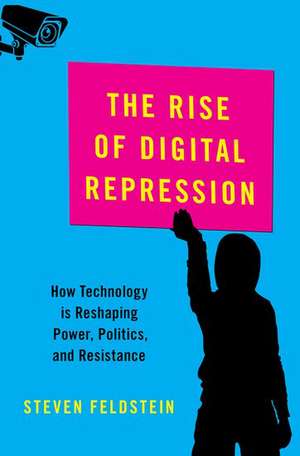The Rise of Digital Repression: How Technology is Reshaping Power, Politics, and Resistance: Carnegie Endowment for International Peace
Autor Steven Feldsteinen Limba Engleză Hardback – 10 aug 2021
Preț: 269.35 lei
Nou
Puncte Express: 404
Preț estimativ în valută:
51.55€ • 53.62$ • 42.55£
51.55€ • 53.62$ • 42.55£
Carte disponibilă
Livrare economică 25 martie-08 aprilie
Preluare comenzi: 021 569.72.76
Specificații
ISBN-13: 9780190057497
ISBN-10: 0190057491
Pagini: 346
Ilustrații: 9 b&w halftones, 18 b&w line drawings, 13 tables
Dimensiuni: 236 x 157 x 31 mm
Greutate: 0.57 kg
Editura: Oxford University Press
Colecția OUP USA
Seria Carnegie Endowment for International Peace
Locul publicării:New York, United States
ISBN-10: 0190057491
Pagini: 346
Ilustrații: 9 b&w halftones, 18 b&w line drawings, 13 tables
Dimensiuni: 236 x 157 x 31 mm
Greutate: 0.57 kg
Editura: Oxford University Press
Colecția OUP USA
Seria Carnegie Endowment for International Peace
Locul publicării:New York, United States
Recenzii
Feldstein's book makes a noteworthy methodological contribution to the literature by introducing digital repression, digital repression capacity, and the AI and big-data global surveillance indexes…. It offers a strong foundation for future research through its analytical approach to case studies and methodological contributions to a fast-growing field.
The Rise of Digital Repression invites us to look beyond digital politics in North America and Europe. Technology in authoritarian hands creates smothering repression in the Philippines, Ethiopia, Thailand, or anywhere one finds governments fear of their own citizens. Advances in artificial intelligence, especially when developed by techno-authoritarian regimes, deepens the concern. Yet, in the end, Feldman guides us through more hopeful alternatives. This is essential reading for those who are concerned about the struggle between freedom and repression.
Steve Feldstein delivers a book that will be viewed as indispensable to anyone concerned with the intersection of technology and the state, and particularly, the evolving impact on people's quest for freedom the world over. In original case studies, he details how the current rising tide of authoritarianism has been enabled by digital repression. This tide could recede; equally compelling are the strategies he outlines for democratic governments, for civil society activists, and for those in the private sector looking to stem the tide.
This book is a must-read on the myriad ways that state repression has adapted to the digital age. Through data-driven analysis and original case studies, Steven Feldstein provides a comprehensive guide to online censorship, disinformation, and surveillance. This is an excellent primer for those looking to understand how to push back against digital authoritarianism.
Digital technologies were once seen as a harbinger of liberalization and democratization. Thanks to 'big data,' A.I., machine learning, facial recognition, and other mass surveillance systems, they have now become an autocrat's best friend and a big business opportunity. With precision and clarity, Steven Feldstein documents the disturbing spread of the political economy of digital repression and offers pathways to help resist it. The Rise of Digital Repression is an important contribution to the scholarly literature on information controls.
The Rise of Digital Repression invites us to look beyond digital politics in North America and Europe. Technology in authoritarian hands creates smothering repression in the Philippines, Ethiopia, Thailand, or anywhere one finds governments fear of their own citizens. Advances in artificial intelligence, especially when developed by techno-authoritarian regimes, deepens the concern. Yet, in the end, Feldman guides us through more hopeful alternatives. This is essential reading for those who are concerned about the struggle between freedom and repression.
Steve Feldstein delivers a book that will be viewed as indispensable to anyone concerned with the intersection of technology and the state, and particularly, the evolving impact on people's quest for freedom the world over. In original case studies, he details how the current rising tide of authoritarianism has been enabled by digital repression. This tide could recede; equally compelling are the strategies he outlines for democratic governments, for civil society activists, and for those in the private sector looking to stem the tide.
This book is a must-read on the myriad ways that state repression has adapted to the digital age. Through data-driven analysis and original case studies, Steven Feldstein provides a comprehensive guide to online censorship, disinformation, and surveillance. This is an excellent primer for those looking to understand how to push back against digital authoritarianism.
Digital technologies were once seen as a harbinger of liberalization and democratization. Thanks to 'big data,' A.I., machine learning, facial recognition, and other mass surveillance systems, they have now become an autocrat's best friend and a big business opportunity. With precision and clarity, Steven Feldstein documents the disturbing spread of the political economy of digital repression and offers pathways to help resist it. The Rise of Digital Repression is an important contribution to the scholarly literature on information controls.
Notă biografică
Steven Feldstein is a senior fellow at the Carnegie Endowment for International Peace in the Democracy, Conflict and Governance Program. Previously, he was the holder of the Frank and Bethine Church Chair of Public Affairs and an associate professor at Boise State University. He served in the Obama administration as Deputy Assistant Secretary of State for Democracy, Human Rights and Labor with responsibility for Africa policy, international labor affairs, and international religious freedom, and as Director of Policy at the US Agency for International Development. He has also served as Counsel on the US Senate Foreign Relations Committee under former chairmen Joe Biden and John Kerry. He received his B.A. from Princeton and his J.D. from Berkeley Law.



